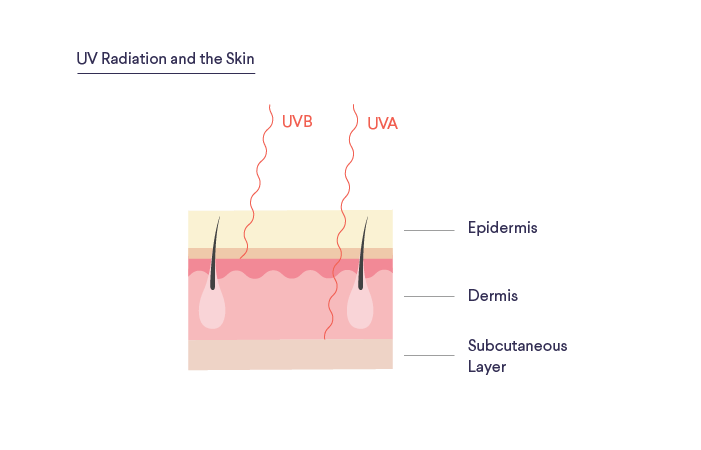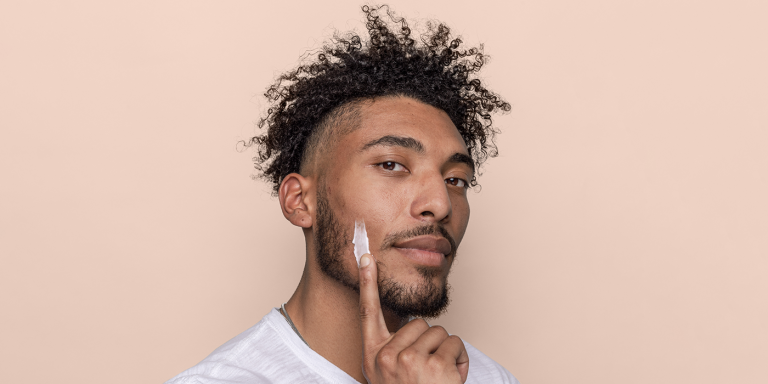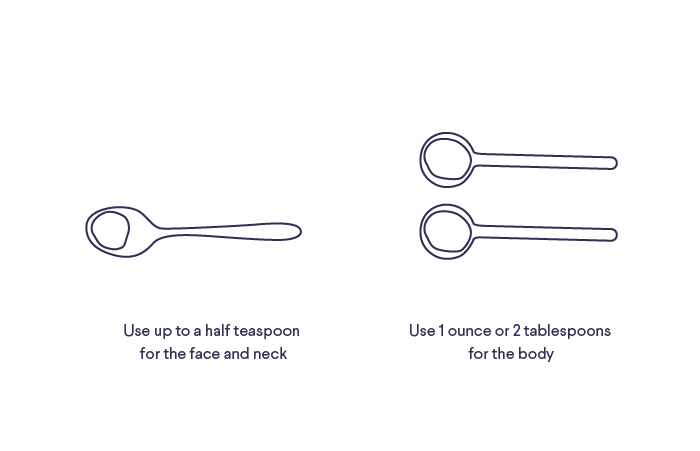How it works:
Share your skin goals and snap selfies
Your dermatology provider prescribes your formula
Apply nightly for happy, healthy skin
How it works:
How it works:
Share your skin goals and snap selfies
Your dermatology provider prescribes your formula
Apply nightly for happy, healthy skin
How it works:
Face sunscreen for acne-prone skin
Zinc oxide provides sun protection for acne-prone and sensitive skin. Bonus: It’s generally safe to use during pregnancy.



In this article
Dermatologists agree that if there’s one step you never want to skip, it’s sunscreen application. It may feel like a drag to apply (or reapply) sunscreen when you’re ready and raring to go, but think of it this way: Future you will be so thankful that you did!
Sunscreen is the most important skincare step of your routine because it helps protect you from skin cancer, photoaging (such as hyperpigmentation and fine lines), and, of course, sunburns. Think of it as your skin’s personal bodyguard. Here you’ll find fully vetted face sunscreens and essential tips and tricks from the experts.
The importance of wearing sunscreen year-round
UV rays can still damage your skin on cloudy days and even when you’re indoors, and they can worsen hyperpigmentation from old acne lesions. That’s why using a broad-spectrum sunscreen with SPF 30 (or more) daily, and reapplying every two hours (even if you’re wearing makeup), is so important. Opt for a lightweight, non-comedogenic sunscreen (one that won’t clog your pores) to help reduce your chance of acne breakouts.
Mineral vs. chemical sunscreen
Sunscreens can be classified as mineral (physical), chemical, or both (hybrid), depending on their ingredients. Both types offer sun protection, but because everyone’s skin type is unique, you may prefer one over another. Here’s what you need to know:
Mineral sunscreen (also called physical sunscreen)
Contains titanium dioxide and/or zinc oxide (zinc oxide may help soothe irritation)
Physically deflects or “bounces” sunlight away from the skin
Certain kinds of physical sunscreen may leave a white cast on the skin
Chemical sunscreen
Contains ingredients such as avobenzone and oxybenzone
Filters and absorbs UV light
May be irritating or cause an allergic reaction in some people
How to choose the right sunscreen for your skin type

Finding a sunscreen that works well for you can depend on your skin type: dry, oily, combination, or sensitive. At the end of the day, the best sunscreen is one that you’re most likely to use daily.
We recommend looking for non-comedogenic products free of pore-clogging ingredients such as coconut oil, lauric acid, and isopropyl palmitate. Avoid certain types of alcohol in skincare products, specifically alcohol denat or denatured alcohol (other versions, such as coconut alcohol and Cetearyl alcohol, are actually fine to use).
Remember, if you have acne-prone or sensitive skin, certain mineral sunscreen ingredients, like zinc oxide, may help soothe the skin. Chemical sunscreens, on the other hand, may irritate sensitive skin, which can contribute to breakouts.
What is SPF?
SPF (sun protection factor) is a number that measures a sunscreen’s ability to prevent UVB rays from damaging the skin. The number is based on how quickly redness forms on sunscreen-protected skin compared to unprotected skin. Although sunscreens with an SPF of 15 protect fairly well against UVB, the American Academy of Dermatology recommends choosing a broad-spectrum sunscreen with SPF of 30 or higher. Broad-spectrum sunscreen protects against UVA and UVB rays. If you’re swimming or sweating, be sure to go with water-resistant sunscreen.

What exactly are UVA and UVB rays? The sun’s UV (ultraviolet) light rays are classified into UVA, a longer wavelength, and UVB, which is shorter. Sunscreens that protect you from UVA and UVB rays are called broad spectrum. Let’s break it down:
UVA
Contributes to photoaging (dark spots and wrinkling)
Contributes to the development of skin cancer
Penetrates clouds and glass
Penetrates deeper into the skin compared to UVB
Contributes to tanning (remember, the only healthy tan is a sunless tan)
UVB
The main cause of redness and sunburn
Contributes to the development of skin cancer
Largely blocked by glass

How to apply sunscreen
Be it chemical or mineral, here’s how to correctly apply sunscreen:
Apply at least 15 minutes before sun exposure.
Use about half a teaspoon for the face and neck.
Use at least one ounce (two tablespoons) for the body.
Reapply every two hours or after swimming, sweating, or toweling off.

How to layer sunscreen under makeup
Ever try to layer makeup on top of sunscreen, only to have it pill or flake off in annoying little white bits? It can be frustrating—but don’t let that put you off from daily sunscreen use! Instead, it may help to apply moisturizer before your sunscreen. Give each layer a few minutes to dry before putting on your makeup. This should give it enough grip so it won’t flake or pill.
Is it safe to use zinc oxide during pregnancy?
Even when you’re pregnant, you still need to use sunscreen. In general, pregnancy-safe sunscreens include broad-spectrum mineral sunscreen that protects against UVA and UVB rays and also protects you and your baby. Mineral sunscreens that use zinc oxide, titanium dioxide, or both sit on the skin’s surface rather than absorbing into the skin. They work by reflecting the sun’s rays from the body.
Certain ingredients in chemical sunscreens, including avobenzone, oxybenzone, octocrylene, homosalate, octisalate, and octinoxate, were found in the bloodstream following application. The Food and Drug Administration recommends further testing to evaluate the ingredients’ safety and potential risks. As always, it is important to review everything with your OBGYN before using products with these or any other active ingredients if you’re pregnant or breastfeeding.
Sunscreen may help shield you from other pregnancy-related conditions that are exacerbated by sun exposure. For example, pregnant women may experience melasma (aka “the mask of pregnancy”). This type of hyperpigmentation shows up as patches or spots, usually on the face, that is tan or brown (darker than your natural skin tone). It usually occurs on the cheeks, forehead, and/or above the upper lip.
Some of the best face sunscreens for acne-prone skin.

If you get breakouts, paying attention to the ingredients in any product you use is essential. We know assessing all your options can be overwhelming, so our dermatology experts picked out a few non-comedogenic sunscreens for acne-prone skin for you to try:
The sunscreen by Curology with SPF 30 is a 100% mineral sunscreen with 9.4% zinc oxide. If you’re a current Curology member, you’ll be happy to know that our dermatologists designed the sunscreen to work with your Curology routine to support your skin goals—so you never have to choose between sun protection and clear skin.
TATCHA Silken Pore Perfecting Sunscreen Broad Spectrum SPF 35 is a lightweight physical and chemical sunscreen with a creamy formula that protects without clogging pores. It doubles as a primer, so it’s perfect for wearing under makeup.
La Roche Posay Anthelios Clear Skin Oil Free Sunscreen SPF 60 is a non-comedogenic, oil-free sunscreen for acne-prone and oily skin that provides broad spectrum SPF 60 protection with water resistance.
Some of the best-tinted sunscreens for acne-prone skin
A tinted sunscreen or tinted moisturizer with SPF does double-duty as a lightweight foundation while protecting your skin from UV radiation. All you need for a fresh-faced, glowy, effortless daytime look (complete with sun protection) is a tinted moisturizer with SPF 30 or higher.
Supergoop! CC Cream 100% Mineral CC Cream SPF 50 helps even the appearance of skin tone and softens the look of fine lines and pores.
Drunk Elephant Umbra Tinte™ Physical Daily Defense Broad Spectrum Sunscreen SPF 30 contains antioxidants to help minimize the appearance of photoaging.
CoTZ Flawless Complexion SPF 50 is a broad-spectrum mineral sunscreen that helps prevent signs of premature aging. Its reef-safe formula and non-greasy texture are great for sensitive, rosacea-prone skin.
MDSolarSciences Mineral Tinted Creme SPF 30 has a natural light tint and matte finish designed for all skin types, and it works well under makeup.
Curology custom skincare just got better

The sunscreen by Curology is a 100% mineral-based SPF 30 sunscreen designed to avoid pore-clogging ingredients and minimize a white cast on your skin once fully rubbed in (make sure to blend well!). Its silky texture and fresh finish make it a no-brainer for daily, effortless use. It’s designed by dermatologists for acne-prone skin (but it works well on all skin types) and works well with all Curology products.
Get your personalized skincare routine with Curology
Get your personalized skincare routine with Curology


If you’re an existing Curology member, getting the sunscreen is easy—just add the item to your next shipment, and we’ll send it right to your door with the rest of your skincare products. For new members, sign up is easy.
FAQs
Finding a sunscreen that works well for you can depend on your skin type: dry, oily, combination, or sensitive. At the end of the day, the best sunscreen is one that you’re most likely to use daily.
We recommend looking for non-comedogenic products free of pore-clogging ingredients such as coconut oil, lauric acid, and isopropyl palmitate. Avoid certain types of alcohol in skincare products, specifically alcohol denat or denatured alcohol (other versions, such as coconut alcohol and cetearyl alcohol, are actually fine to use).
SPF (sun protection factor) is a number that measures a sunscreen’s ability to prevent UVB rays from damaging the skin. The number is based on how quickly redness forms on sunscreen-protected skin compared to unprotected skin. Although sunscreens with an SPF of 15 protect fairly well against UVB, the American Academy of Dermatology recommends choosing a broad-spectrum sunscreen with SPF 30 or higher. Broad-spectrum sunscreen protects against UVA and UVB rays. If you’re swimming or sweating, be sure to go with water-resistant sunscreen.
Be it chemical or mineral, here’s how to correctly apply sunscreen:
Apply at least 15 minutes before sun exposure.
Use about half a teaspoon for the face and neck.
Use at least one ounce (two tablespoons) for the body.
Reapply every two hours or after swimming, sweating, or toweling off.
Ever try to layer makeup on top of sunscreen, only to have it pill or flake off in annoying little white bits? It can be frustrating—but don’t let that put you off from daily sunscreen use! Instead, it may help to apply moisturizer before your sunscreen. Give each layer a few minutes to dry before putting on your makeup. This should give it enough grip so it won’t flake or pill.
Even when you’re pregnant, you still need to use sunscreen. In general, pregnancy-safe sunscreens include broad-spectrum mineral sunscreen that protects against UVA and UVB rays and also protects you and your baby. Mineral sunscreens that use zinc oxide, titanium dioxide, or both sit on the skin’s surface rather than absorbing into the skin. They work by reflecting the sun’s rays from the body.
P.S. We did the homework so you don’t have to:
American Academy of Dermatology. Sunscreen FAQs. Ibid.
Gupta, M., et al. Zinc therapy in dermatology: A review.Dermatology Research and Practice. (2014 July 10).
Wilson, B.D., et al. Comprehensive review of ultraviolet radiation and the current status on sunscreens.Journal of Clinical and Aesthetic Dermatology. (September 2015).
American Academy of Dermatology. Sunscreen FAQs. (n.d.).
Wilson, B.D., et al. Comprehensive review of ultraviolet radiation and the current status on sunscreens. Ibid.
U.S. Food and Drug Administration.Sunscreen: How to help protect your skin from the sun. (2021 November 8).
Matta, M.K., et al. Effects of sunscreen application on plasma concentration of sunscreen active ingredients: A randomized clinical trial.Journal of the American Medical Association. (2020 January 21).
U.S. Food and Drug Administration. FDA in brief: FDA announces results from second sunscreen absorption study. (2020 January 21).
American Academy of Dermatology. Melasma: Overview. (n.d.)
Elise Griffin is a certified physician assistant at Curology. She received her Master of Medical Science in physician assistant studies from Nova Southeastern University in Jacksonville, FL.
* Subject to consultation. Subscription is required. Trial is 30 days. Results may vary.
Sunscreen can’t prevent all harm from UV rays, but we highly recommend using it which you should because it’s still one of the most effective ways to minimize signs of aging and risks of skin cancer.

Curology Team

Elise Griffin, PA-C
Related Articles
Is my hairline receding? The signs and stages, explainedFinasteride vs. minoxidil: Which hair loss treatment is right for you?How to remove makeup without makeup remover wipesThe complete guide to face cleansers for every skin typeSkincare tips for dry skin, according to dermatology providersPopular Articles
Ask Curology: Is my cold breaking me out?Slugging: The dermatologist-approved skincare hack going viral on TikTokTretinoin vs retinol: What’s the difference?How to create a self-care routine that actually sticksYour 2023 skincare horoscopeTry prescription skincare
Get routine essentials

Good skin days ahead
- Breakouts
- Redness
- Fine lines
- Dark spots
- Hair thinning